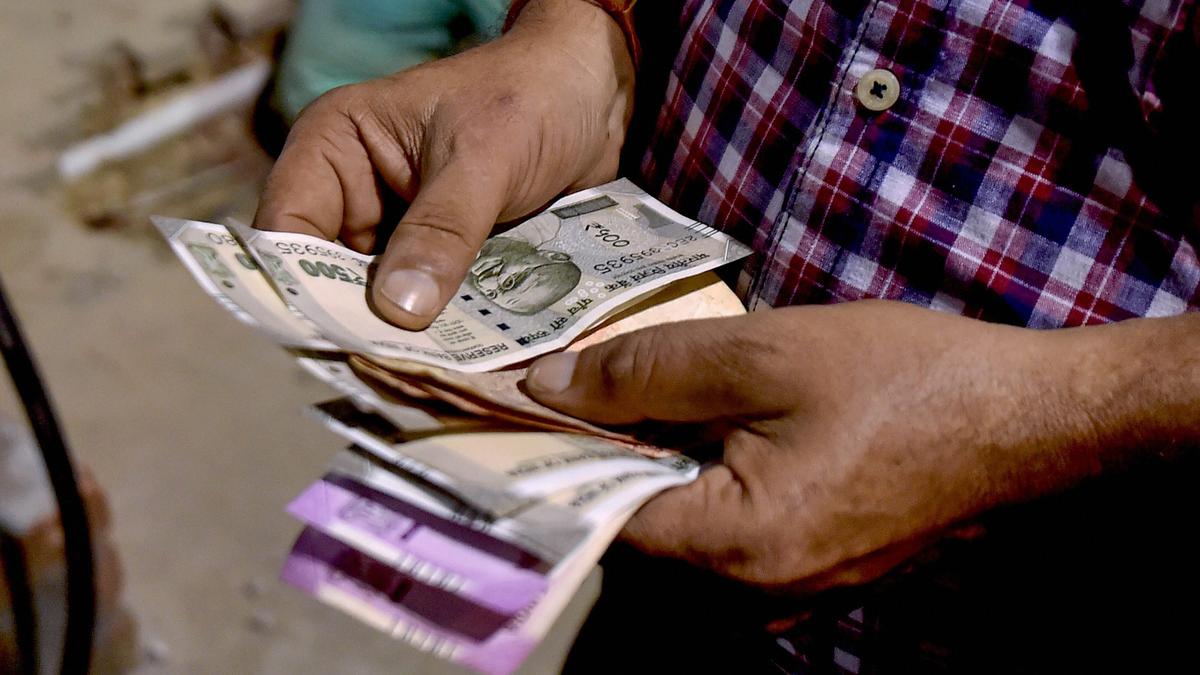The rupee traded in a tight range and fell 4 paise to close at an all-time low of 84.43 (provisional) against the U.S. dollar. File
| Photo Credit: Reuters
The rupee traded in a tight range and fell 4 paise to close at an all-time low of 84.43 (provisional) against the U.S. dollar on Thursday (November 14, 2024), weighed down by unabated foreign fund outflows and strong dollar demand from investors.
Forex traders said the downward pressure on the USD/INR pair is largely driven by persistent inflation and significant foreign outflows.
At the interbank foreign exchange, the rupee opened at 84.40 against the U.S. dollar. During the session, the local currency touched a high of 84.39 and a low of 84.43. It finally settled at its fresh all-time low of 84.43 (provisional) against the greenback, 4 paise lower than its previous close.
On Wednesday, the rupee moved in a narrow range and settled flat at 84.39 against the U.S. dollar.
“The US dollar index has hit a fresh cycle high of 106.76 as it approaches the stiff resistance at 107.50,” said Praveen Singh – Associate VP, Fundamental Currencies and Commodities, Sharekhan by BNP Paribas.
“There was no respite on the US inflation front as the data released yesterday showed that the U.S. core consumer price index increased 0.3% for a third month. It was up 3.3% on a year-on-year basis,” Mr. Singh said.
Meanwhile, the dollar index, which gauges the greenback’s strength against a basket of six currencies, was trading higher by 0.30% at 106.80.
Brent crude, the global oil benchmark, rose 0.03% to $72.30 per barrel in futures trade.
Forex traders said the USD-INR pair may rise to ₹85 level in the near term, though the intervention by the Reserve Bank of India (RBI) may slow the pace.
On the global front, China’s recent 1.4 trillion yuan stimulus, coupled with expectations of more fiscal support, has strengthened Chinese markets and added downward pressure on Indian assets, traders said.
Moreover, India’s inflation surge is putting additional pressure on the currency.
Wholesale price inflation rose to a 4-month high of 2.36% in October as prices of food items, especially vegetables, and manufactured goods turned dearer, according to government data released on Thursday.
Retail inflation breached the RBI’s upper tolerance level, soaring to a 14-month high of 6.21 per cent in October mainly on account of rising food prices.
In the domestic equity market, the 30-share BSE Sensex fell 110.64 points, or 0.14%, to close at 77,580.31 points, while Nifty fell 26.35 points, or 0.11%, to settle at 23,532.70 points.
The latest government data released on Thursday (November 14, 2024) showed India’s merchandise exports in October rose by 17.25% to $39.2 billion against $33.43 billion a year ago.
Imports also increased by 3.9% to $66.34 billion in October compared to $63.86 billion in the year-ago period. The trade deficit, or the gap between imports and exports, was $27.14 billion during the month under review.
Foreign Institutional Investors (FIIs) were net sellers in the capital markets on Wednesday, as they offloaded shares worth ₹2,502.58 crore, according to exchange data.
Published – November 14, 2024 04:53 pm IST



